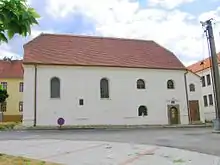Dolní Kounice Synagogue
The first traces of Jewish settlement in Dolní Kounice (today a town in the South Moravian Region of the Czech Republic) are from half of 15th century. First written note comes from 1581. The old synagogue was located on eastern part of the village and was destroyed by Swedish troops during Thirty Years' War, in 1645.
| Dolní Kounice Synagogue Synagoga v Dolních Kounicích | |
|---|---|
 Northern side of the synagogue as seen from the square. | |
| Religion | |
| Affiliation | Orthodox Judaism |
| District | Brno-Country District |
| Ecclesiastical or organizational status | Museum |
| Location | |
| Location | Dolní Kounice, Czech Republic |
| Architecture | |
| Style | Baroque |
| Completed | 1656. Ceased functioning during World War II. |
A new one has been built between 1652–1656 in the middle of the new ghetto (the Jewish district of Dolní Kounice, židovská čtvrť v Dolních Kounicích).
The building, designed in Baroque style, has rectangular ground plan and two floors. At the half of 19th century new tract was added and used to extends tribune for women.
In early 1940s Nazis closed down the religious services and moved the decorations to the Jewish Museum in Prague. After the war the building was used as storehouse. In 1991 it was returned, as a part of restitutions, to the Jewish community in Brno. In 1994 the synagogues was reconstructed.
Today the synagogue also hosts small collection of Jewish historical artefacts and art exhibitions.
Gallery
External links
References
- Jaroslav Klenovský: "Židovská obec v Dolních Kounicích" (Jewish district in Dolní Kounice), published by the town municipality in 1997, 44 pages.


